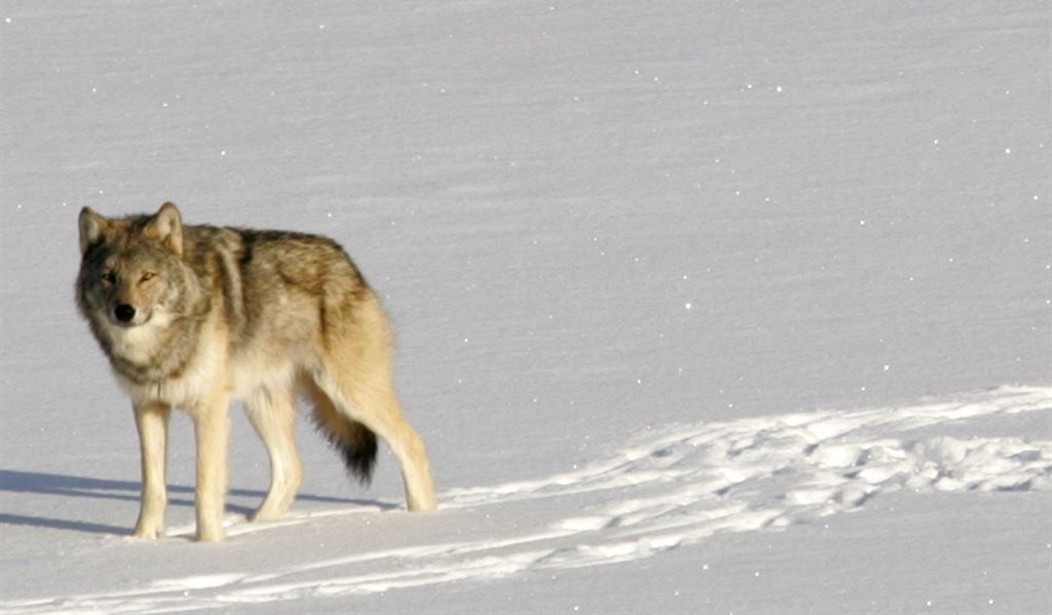Here in Alaska, we deal with a lot of wildlife that just doesn't appear in most of the United States: for example, we have bears that can run 35 miles per hour, bite through a moose's thigh bone, and rip the door off your truck to get to the sandwich in the lunch box you left in the cab.
We also have wolves. At least one fair-sized pack lives in our area. One early morning last winter I was walking from house to office when I heard them singing. I stopped and stood, entranced, for maybe ten minutes in -20 temperatures to listen to the wolf song. Our neighbor's sled dogs chimed in, so we were serenaded from two directions. It's a neat thing to hear - chilling, primal, beautiful.
We're used to having these animals around, and we know how to live among them. What we don't have a lot of is big ranches and people with huge cattle herds, which makes the presence of big bears and wolves rather less controversial. States like Oregon don't have that luxury of space and no livestock, and there, wolves are beginning to be a problem - and the Biden administration is not receptive to calls from Republican lawmakers to delist wolves so that their numbers can be managed.
A group of 20 House Republicans is urging the Biden administration to roll back protections for the gray wolf, pointing to the species' growing population size and conflicts with ranchers and farmers.
The GOP coalition, led by Rep. Cliff Bentz, R-Ore., argued in a letter to U.S. Fish and Wildlife Service (FWS) Director Martha Williams that the gray wolf no longer needed to be listed under the Endangered Species Act. He wrote that "protection merely for the sake of protection" is not the purpose of the law. Instead, he encouraged the agency to focus its efforts on protecting species in danger of extinction.
"The substantial growth in the population of gray wolves throughout Oregon and the western United States poses significant challenges for ranchers, farmers, and outdoorsmen alike," Bentz, who chairs the House Natural Resources Committee's Water, Wildlife, and Fisheries Subcommittee, told Fox News Digital in a statement.
The purpose of the Endangered Species Act, of course, shouldn't be to favor wildlife over humans, especially when human livelihoods are at stake. But then, in wildlife issues as in so many other things, the federal government frequently oversteps, and the Biden administration daily seems determined to set new records for overstepping.
See Related: Where's the Beef? Drought, Rising Costs Driving US Beef Production to Record Lows
Colorado Eyes Reintroduction of Wolverines
The problem with the "Endangered" categorization is that it can present ranchers and farmers defending property (stock) with a dilemma, as there are legal penalties for killing an animal so listed. That's not to say that wolves that are bothering livestock won't be killed; it will just be done under the 3-S rule: "Shoot, Shovel, Shut up." But it shouldn't have to be that way.
Perhaps it's time for the U.S. Fish and Wildlife Service to take a different approach to the whole idea of "endangered species." Nobody is proposing wiping every wolf off the face of the planet, after all, and just here in Alaska we have somewhere between 7,000 and 11,000 wolves, not to mention how many are in neighboring Canada. That's a population, here in the state with the lowest (human) population density, that is in no danger whatsoever. That being the case, it hardly seems necessary to list as "endangered" a smaller population in an area where they present a conflict with humans.
Nobody wants wolves deliberately driven to extinction. And they won't be. But ranchers and farmers have rights, too, including the right to protect their own property. We have plenty of wolves here in the Great Land, and we chose to live here knowing that; nobody reintroduced them at taxpayer expense and nobody is offering to toss us in the pokey if we kill one that's after the chickens.
That's how it should be.














Join the conversation as a VIP Member